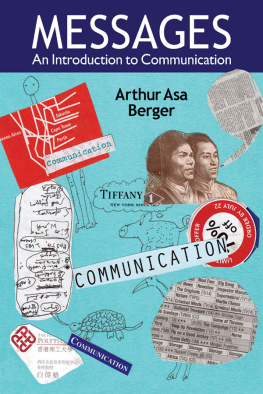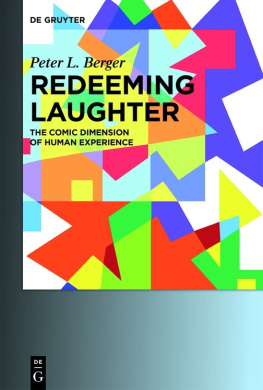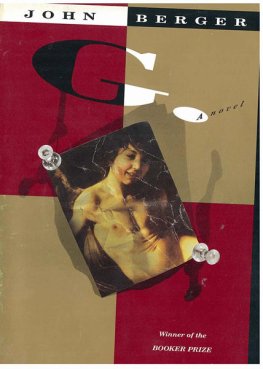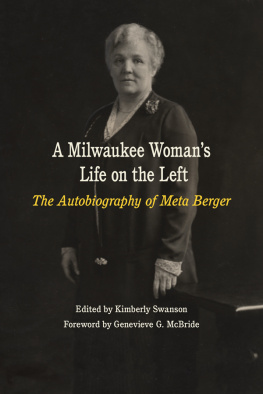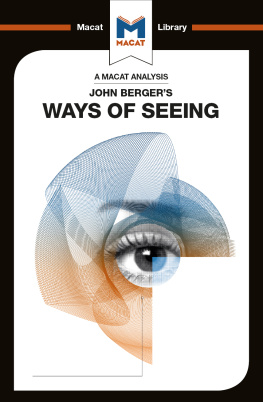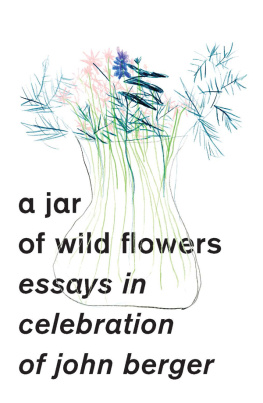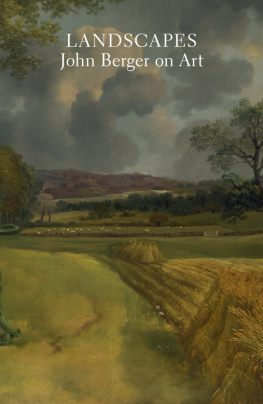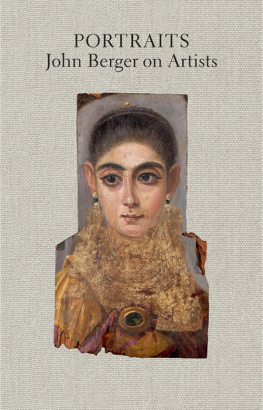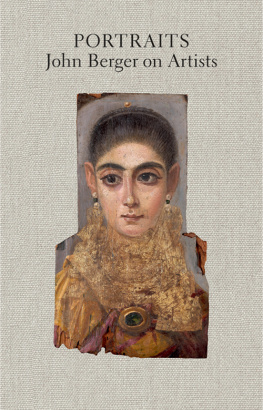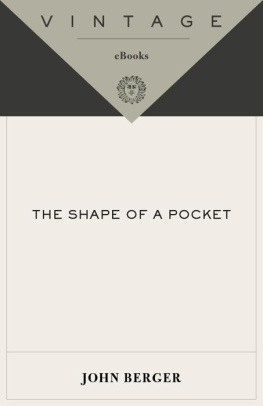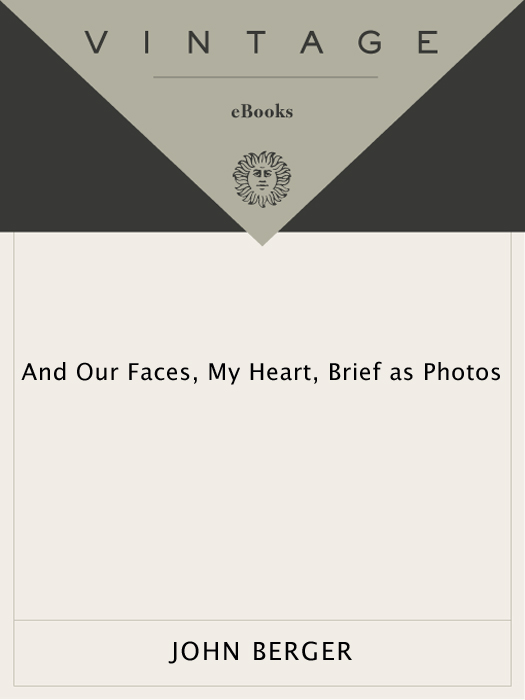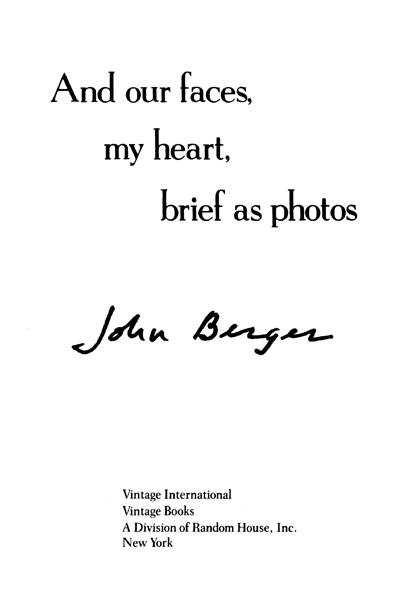THE WORKS OF JOHN BERGER
Pig Earth (first book
of the Into Their Labours trilogy)
Once in Europa (second book of the trilogy)
Lilac and Flag (third book of the trilogy)
A Painter of Our Time
Permanent Red
The Foot of Clive
Corkers Freedom
A Fortunate Man
Art and Revolution
The Moment of Cubism and Other Essays
The Look of Things: Selected Essays and Articles
Ways of Seeing
Another Way of Telling
A Seventh Man
G.
About Looking
And Our Faces, My Heart, Brief as Photos
The Sense of Sight
The Success and Failure of Picasso
Keeping a Rendezvous
To the Wedding
King
Photocopies
The Shape of a Pocket
Selected Essays

First Vintage International Edition, September 1991
Copyright 1984 by John Berger
All rights reserved under International and Pan-American Copyright Conventions. Published in the United States by Vintage Books, a division of Random House, Inc., New York, and simultaneously in Canada by Random House of Canada Limited, Toronto. Originally published by Pantheon Books, a division of Random House, Inc., New York, in 1984.
Portions of this book previously appeared, in somewhat different form, in The Village Voice.
Library of Congress Cataloging-in-Publication Data
Berger, John.
And our faces, my heart, brief as photos / John Berger
1st Vintage International ed.
p. cm.
Reprint. Originally published: New York: Pantheon Books, c1984.
eISBN: 978-0-307-79425-3
I. Title.
[PR6052.E564A82 1991]
823.912dc20 91-50221
v3.1
I would like to express my solidarity with the Transnational Institute, Amsterdam, and the Institute of Policy Studies, Washington, D.C., and to thank them for their support and encouragement during all the years when this book was being conceived and written. I would also like to thank New Society, London, and The Village Voice, New York, for publishing a number of articles in which I worked out some of the ideas envisaged for this book. Finally I would like to thank Anthony Barnett for his critical help.
Contents
Part One is about Time.
Part Two is about Space.
1/Once
When I open my wallet
to show my papers
pay money
or check the time of a train
I look at your face.
The flowers pollen
is older than the mountains
Aravis is young
as mountains go.
The flowers ovules
will be seeding still
when Aravis then aged
is no more than a hill.
The flower in the hearts
wallet, the force
of what lives us
outliving the mountain.
And our faces, my heart, brief as photos.
ONCE UPON A TIME
The first was a hare. At two thousand meters on a mountain frontier. Where are you going? asked the French customs officer. To Italy, I said. Why didnt you stop? he asked. I thought you beckoned me on, I replied. And at that moment everything was forgotten because a hare ran across the road, ten yards away from us. It was a lean hare with tufts on the tips of its ears of brown smoke. And although it was running slowly, it ran for its life. Sometimes that can happen.
A few moments later the hare ran back across the road, this time pursued by half a dozen men, who nevertheless were running much slower than it, and who had the air of having just jumped up from a meal. The hare ran upwards towards the crags and the first patch of snow. The customs man was shouting instructions about how to catch the hareand I drove on, over the frontier.
The next animal was a kitten. An entirely white kitten. It belonged to a kitchen with an uneven floor, an open chimney, a wooden table that was somewhat broken, and rough whitewashed walls. Against the walls the kitten was almost invisible except for its dark eyes. When it turned its head away, it disappeared into the wall. When it jumped about over the floor or onto the table, it was like a creature that had escaped from the walls. The way that it appeared and disappeared gave it the mysterious intimacy of a household god. I have always thought that household gods were animals. Sometimes visible and sometimes invisible, but always present. As I sat at the table, the cat jumped onto my legs. It had sharp white teeth as white as its fur. And a pink tongue. Like all kittens it played continually: with its own tail, on the backs of the chairs, with scraps on the floor. When it wanted to rest, it looked for something soft to lie on. And watching it, fascinated, throughout a week, I observed that, whenever it could, it chose something whitea towel, a white pullover, some washing. Then, with eyes shut and mouth closed, curled up, it became invisible, surrounded by the white walls.
A village in the hills, not far from Pistoia. The village cemetery was rectangular with high walls round it and wrought-iron gates. At night most of the gravestones were lit up, each with its individual candlelight. But the candles were electric, and they were switched on with the street lamps. They burnt all night and there were many more of them than street lamps in the village. Just past the cemetery, the road turned sharply and, at the bend, a dust road led off to a farm. On this dust road I saw one of the grey ducks.
On several occasions I had seen the whole family. They often installed themselves on the grass bank under the bushes opposite the cemetery. The first time I saw the cemetery lights at dusk, I noticed the ducks waddling around in the night-green grass. A duck, a drake and about six ducklings.
This time it was only the drake, stationary, in the middle of the road, pawing the dust, with his head down. It took a minute or so before I realized that he was on the back of the duck, who was entirely invisible. Once or twice she spread her wings out and they appeared under his feet, before she settled down again, into the dust. His thrusts became faster. Finally, having reached his climax, the drake fell off the duck and she became visible. He fell off her sideways onto the road. He fell as if he had been shot, lying on his side. A small bird-shaped grey bag, inert in the dust, as if full of lead. She looked around, got to her feet, beat her wings, stretched her neck and wandered off, confident that the ducklings would now find her.
One night, walking in the countryside near Prijedor in Bosnia, I found a solitary glow-worm, with its amber-green light, under some grasses. I picked it up and carried it on my finger where it glowed like an electric opal on a ring. When I approached the house the other lights competed too strongly, and it put its own out.
In the bedroom I placed it on some leaves on top of the chest of drawers. When I put the light out, the glow-worm glowed again. At the back of the dressing table was a mirror which faced the window. If I lay on my side I saw a star reflected in the mirror and the glow-worm beneath on the chest of drawers. The only difference between them was that the light of the glow-worm was slightly greener, more glacial, further away.




